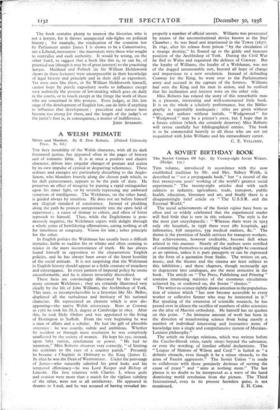A SOVIET BIRTHDAY BOOK
Tins volume, introduced in accordance with the now established tradition by Mr. and Mrs. Sidney Webb, is described as "not a propaganda book," but "a record of the first twenty-one years' working of the world's greatest social experiment." The twenty-eight articles' deal with such subjects as industry, agriculture, trade, transport, public health, education, literature and art, and finally there is a disappointingly brief article on "The U.S.S.R. and the External World."
The social achievements of the Soviet rigime have been so often and so widely celebrated that the experienced reader will find little that is new in this volume. The style is for the most part encyclopaedic : "Whereas there were in 1913 only i60 hospitals, in 1936 there were 280 hospitals, 442 infirmaries, 658 surgeries, 559 medical stations, &c." The theme is the provision of health services for transport workers. But achievements, however creditable, become dull when related in this manner. Nearly all the authors seem terrified of committing themselves to anything which might be construed as an opinion, unless it is pure panegyric or can be expressed in the form of a quotation from Stalin. The writers on art, music, and the theatre and the cinema are least subject to this inhibition ; and these chapters, though necessarily apt to degenerate into catalogues, are the most attractive in the book. The article on "The Press, Publishing and Printing contains interesting statistics of the enormous circulations achieved by, or conferred on, the Soviet "classics."
The writer on science rightly draws attention to the popularisa- tion of science which "has now become accessible to every worker or collective farmer who may be interested in it." But speaking of the extension of scientific research, he has passed over in silence the sacrifice of numbers of older scientists on the altar of Marxist orthodoxy. He himself has no qualms on this point. "An immense amount of work has been in the direction of transforming science from being merely a number of individual interesting and instructive items of knowledge into a single and comprehensive system of Marxian- Leninist philosophy."
The article on foreign relations, which was written before the Czecho-Slovak crisis, rarely strays beyond the substance, or even the wording, of familiar official declarations. The "League of Nations of Wilson and Cecil" is hailed as "a definite obstacle, even though it be a minor obstacle, to the aims of Fascist aggressors." The Soviet Union "is ready to collaborate with those genuinely desirous of serving the cause of peace" and "aims at nothing more." The last phrase is no doubt to be interpreted as a wave of the hand dismissing world revolution from the picture. The Third International, even in its present harmless guise, is not


































 Previous page
Previous page